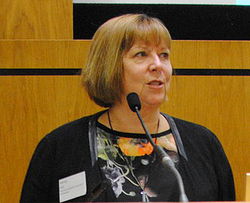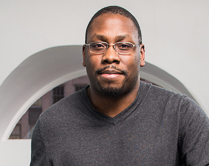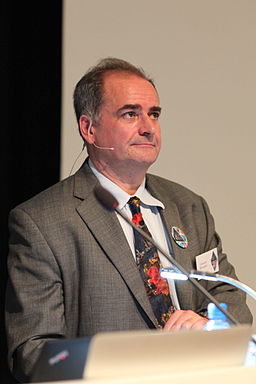The magic kingdom
Note: This is a slightly edited version of a talk I gave (via recorded video), at this week's Safer Internet Forum.
We used to talk about "cyberspace" as separate from the physical world. Those of us who remember the world before the internet remember why: we had to dial up and wait to connect in order to talk to strangers. For today's young people, brought up with pervasive broadband and smartphones, the internet is a conduit to their real-life friends and helps them navigate the real world; a separate "cyberspace" is meaningless.
The babies being born now will learn to assume that everything in their world is connected to everything else. What's left of the division between virtual and physical worlds is being further eroded by the "Internet of Things", the effort to add sensors and "intelligence" to physical objects.
A lot of adoption is being driven by environmental concerns and cost. In Glasgow, for example, sensors inside streetlights save energy (and money) by dimming them when no one's around. Inside homes, new "smart" electrical meters have wireless connections so they can be read remotely, and TVs have internet connections. New cars are clusters of computers on wheels with wireless entertainment systems and keyless entry. The overall result will be a much more responsive physical world, but also one that is far better equipped to scrutinize every aspect of our lives. The "Internet of Toys", as manufacturers like Disney are calling it, will be today's babies' first experience of this.
Every device capable of functioning autonomously in response to changes in its environment is enabled to do so via sensors. TVs that respond to voice commands have microphones, Glasgow's streetlights have microphones and cameras, your smartphone has all those plus GPS, accelerometers, gyroscopes, and much more. Fetch Robotics' pet robot dog, demonstrated at We Robot 2013 by Ian Danforth, has all of these; the idea is owners teach their pets new tricks and then share them via the internet with other owners. What could possibly go wrong with that?
All these sensors collect a steady stream of data. Twenty years ago, lacking today's bandwidth, all that data would have been processed locally on either the device itself or a physically attached computer. Today, the data is uploaded to the cloud for processing on remote, much more powerful computers. This is what happens with voice-activated assistants like Apple's Siri, Microsoft's Cortana, Google Now, or Samsung's smart TVs: what you say in front of the microphone is uploaded to the cloud, where it is added to the ever-growing pile of information the system has about you. You will not necessarily know how, when, or with whom this data is shared. This is exactly the design of Mattel's new Hello Barbie.
Mattel's marketing information for Hello Barbie  indicates that it uploads the speech it hears when someone presses a button on the doll's belt buckle, the information will be stored in the cloud, and parents will have access via online accounts. For me, this creates the image of a parent being able to monitor all conversations their child has with the doll. Some parents may like this; a friend and I used sometimes to eavesdrop with vast amusement when her young son enacted full-bore military battles in the bathtub. But even a very young child deserves to have private and privately expressed thoughts. The US Campaign for a Commercial-Free Childhood has called the doll "creepy" and points out that while the child thinks they're talking to a doll in reality they're talking to a commercial conglomerate whose only interest in them is financial.
indicates that it uploads the speech it hears when someone presses a button on the doll's belt buckle, the information will be stored in the cloud, and parents will have access via online accounts. For me, this creates the image of a parent being able to monitor all conversations their child has with the doll. Some parents may like this; a friend and I used sometimes to eavesdrop with vast amusement when her young son enacted full-bore military battles in the bathtub. But even a very young child deserves to have private and privately expressed thoughts. The US Campaign for a Commercial-Free Childhood has called the doll "creepy" and points out that while the child thinks they're talking to a doll in reality they're talking to a commercial conglomerate whose only interest in them is financial.
More interesting may be Nübi,  which teaches kids programming by using a "magic flower" to help a nearly-arrived cuddly alien arrival navigate our world, and Dynepic, which is launching a Kickstarter campaign to build a modular platform that is intended to encourage exploration, programming, and engineering. My personal skepticism kicks in with Dynepod's claim that the "toy will grow with the child" because the company will be able to add new functions and capabilities via the cloud. There have always been toys that grew with the child: the toys that allowed kids to exercise their own imagination.
which teaches kids programming by using a "magic flower" to help a nearly-arrived cuddly alien arrival navigate our world, and Dynepic, which is launching a Kickstarter campaign to build a modular platform that is intended to encourage exploration, programming, and engineering. My personal skepticism kicks in with Dynepod's claim that the "toy will grow with the child" because the company will be able to add new functions and capabilities via the cloud. There have always been toys that grew with the child: the toys that allowed kids to exercise their own imagination.
As it becomes ever easier for parents to monitor their children's thoughts and as governments adopt increasingly powerful surveillance technologies, we are teaching our kids that constant monitoring is normal and that being watched means they're safe. This message is all around us - think how many times a day you hear that "CCTV is in operation for your safety". Today's kids are growing up with a very different model of what "freedom" looks like than we did.
There really is a great educational opportunity here, but it's unintended by the manufacturer: we can use these toys to teach kids about the way technology design constrains what they can do with the gadgets around them and how to work through privacy policies and understand the tradeoffs involved in accepting them. This kind of teaching really can grow with the child, since most companies change their policies from time to time, almost always in the direction of retaining more data and sharing it more widely. These kids are growing up in a world where some commercial company is trying to intermediate and monetize every relationship they have; to live in this future they need to understand this in a fundamental, instinctive way.
Wendy M. Grossman is the 2013 winner of the Enigma Award. Her Web site has an extensive archive of her books, articles, and music, and an archive of earlier columns in this series. Stories about the border wars between cyberspace and real life are posted occasionally during the week at the net.wars Pinboard - or follow on Twitter.




-thumb-230x241-113.jpg)
 Caspar Bowden was
Caspar Bowden was  the culture is
the culture is 